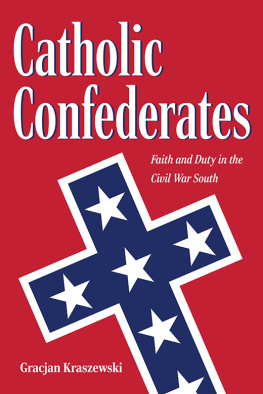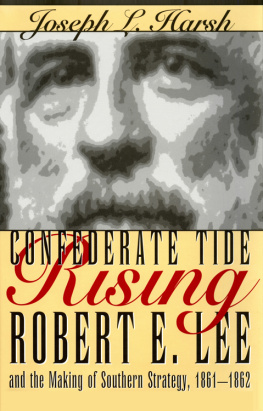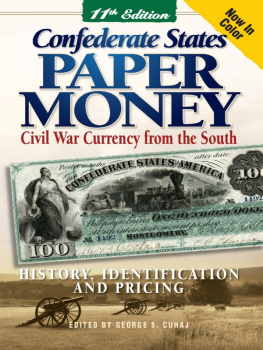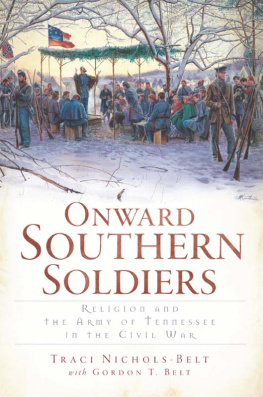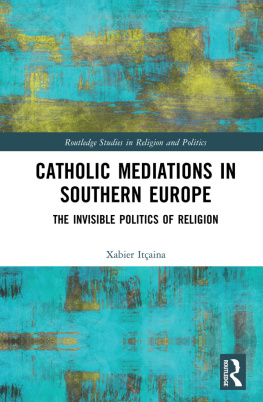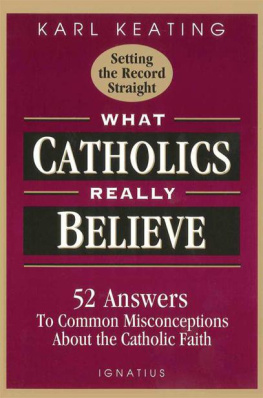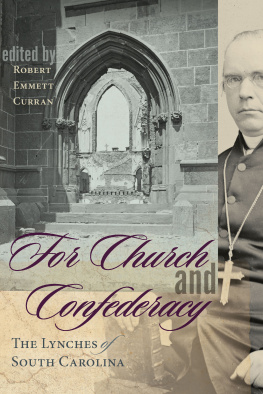2020 by The Kent State University Press, Kent, Ohio 44242
ALL RIGHTS RESERVED
Library of Congress Catalog Number 2019054932
ISBN 978-1-60635-395-0
Manufactured in the United States of America
No part of this book may be used or reproduced, in any manner whatsoever, without written permission from the Publisher, except in the case of short quotations in critical reviews or articles.
LIBRARY OF CONGRESS CATALOGING-IN-PUBLICATION DATA
Names: Kraszewski, Gracjan Anthony, 1987- author.
Title: Catholic Confederates : faith and duty in the Civil War South / Grajan Kraszewski.
Other titles: Civil War era in the South.
Description: Kent, Ohio : The Kent State University Press, [2020] | Series: The Civil War era in the South | Includes bibliographical references and index.
Identifiers: LCCN 2019054932 | ISBN 9781606353950 (cloth) | ISBN 9781631014017 (epub) | ISBN 9781631014024 (pdf)
Subjects: LCSH: Catholics--Southern States--History--19th century. | Christianity and politics--Southern States--History--19th century. | United States--History--Civil War, 1861-1865--Religious aspects. | Confederate States of America--History.
Classification: LCC E489 .K73 2020 | DDC 973.7/3013--dc23
LC record available at https://lccn.loc.gov/2019054932
242322212054321
This book would not exist without David Nolen: associate professor, assistant editor, reference librarian, veritable polymath, and, truly, one of the nicest people anyone could hope to meet. I first met David in the fall of 2012 while I was a graduate student at Mississippi State, seeking his advice on a seminar paper on nineteenth-century Southern Catholics. Up to that point, I had found little. In what couldnt have been more than twenty minutes of searching, David opened a floodgate of information, not the least of which was the Civil War diary of William Henry Elder, bishop of Natchez, who would become a central figure of my work. David lit the first spark to this project, and for that I am deeply thankful. That he is a die-hard Crimson Tide fan only detracts from my gratitude a little.
I am indebted to Alison Collis Greene, my advisor, for guiding this project from the preparatory phase through many revisions unto completion. I am even more grateful to have been able to observe how a first-rate scholar goes about her work. I extend similar thanks to the three other members of my committee: William Anthony Hay, Andrew Lang, and Anne Marshall, as well as the many other professors who helped me during my time at Mississippi State, in particular, Jason Phillips, Dennis Doyle, Mary Kathryn Barbier, Richard Damms, and Stephen Brain. I am grateful also for the friendship and support of my fellow graduate students, most especially Alan Harrelson, Rachel DAddabbo, Karrie Barfield, and Cameron Zinsou. Thank you all.
Special thanks to MSU department head Alan I. Marcus. His deft leadership has enabled students like me to receive scholarships that finance their studies while simultaneously granting them invaluable teaching and research experience. I am likewise grateful to Emeritus Professor John F. Marszalek for selecting me to give the 2015 Marszalek Lecture at MSU, allowing me the opportunity to present a 1 percent distillation of my entire dissertation, which helped me focus the thesis and overall scope of my work.
Two travel grants enabled me to accomplish significant portions of my research. To Peter Ryan and the MSU Office of the Provost, thank you for funding my travel to the diocesan archives in Charleston, South Carolina; to the archivist in Charleston, Brian P. Fahey, a sincere thanks for all of your help. Since it would be wrong for a Catholic living in the United States to have never visited the American university that is literally named Our Lady, I thank the University of Notre Dame Cushwa Center for a travel grant allowing me to come research at that institutions archives. (To Our Lady herself, I wish to extend the fullest measure of hyperdulia.) To everyone at Notre Dame, especially Senior Archivist William Kevin Cawley, thank you. In equal measure to the archivists at the Catholic University of America, those working in Emmitsburg, Maryland, at the Daughters of CharityProvince of St. Louise Archives, and those at the Ulysses S. Grant Presidential Library in Starkville, Mississippi: thank you all very much. Special thanks, too, to Rhett Lawson and his advisor, Molly Weathers, for their help with this project.
I am deeply grateful to James McCartin, Notre Dame PhD and current director of Fordham Universitys Center on Religion and Culture. I took his American history class the first fall of my first undergraduate year in collegeat the time he and I were both at Seton Hall Universityand it is no exaggeration to say this experience solidified my desire to become a professor myself. Years later, at MSU, he assisted me with a historiography paper and encouraged me to apply for the Cushwa Grant. For this, and everything, thank you, Jim. Additionally, I extend a very special thanks and warm greeting to Cristofer Scarboro of Kings College, my undergraduate advisor and a man with whom I share my current institution, the University of Illinois at Urbana-Champaign.
I completed this book while working in the UIUC history department and want to extend warm gratitude to the department head, Clare Crowston, and all of the wonderful scholars and people at Illinois (especially my students) who have made my time there so pleasant. The warmest thanks, too, to Bill Sullivan, head of the UIUC Department of Landscape Architecture. I would be remiss if I did not also thank the assistant chaplain at the UIUC Newman Center, Father Chase Hilgenbrinck, for all he has done for my family and me during our time here. I also thank Fr. Chase for his work at Deportivo ublense and elsewhere and for best embodying the joie de vivre reminiscent of a young Karol Wojtya.
I extend a special thank you to Will Underwood, Brian Miller, and everyone at and associated with the Kent State University Press. From the first moment my manuscript fell into their hands, I have believed there was no better place for it. Everything they have done in bringing this project to fruition has been both necessary and greatly appreciated, and, I am certain, the book would not be what it is without their expertise. The same goes for the archives and depositories that granted me permission to use the photos in this book; it is thanks to them that the characters who grace these pages come to life and can forge that important bond between the reader and the subject. Thank you all.
Finally, especially, and most importantly, I thank my family. To my father, Charles, and my mother, Aleksandrano son could have better parents. No son could have better role models and friends. (To read Chanameed but once is to understand the English language as it was meant to hum and snap.) Bardzo was kocham. The same thanks and love to my brother, Konrad, who has one of best baseball swings I have ever seen and put that to use to practically singlehandedly down the Swiss on their own turf in Zurich. He is intelligent and funny in a way hard for me to describe. Konrad, suffice to say: youre a boss.

